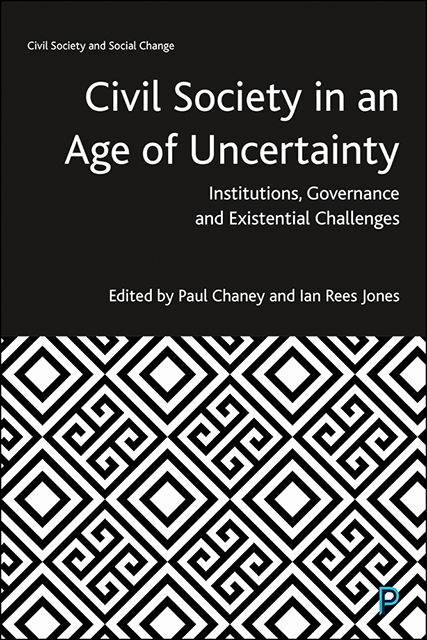Book contents
- Frontmatter
- Contents
- List of tables and figures
- Notes on contributors
- Acknowledgements
- 1 Introduction: Locating civil society
- 2 Existential challenges
- 3 Civil society and the governance of city region economic development
- 4 Civil society, pandemic and the crisis of welfare: exploring mixed economy models of welfare in domiciliary adult social care in a devolved UK
- 5 The contemporary threat to minority languages and cultures: civil society, young people and Celtic language use in Scotland and Wales
- 6 Digital threat or opportunity? Local civil society in an age of global inter-connectivity
- 7 Democratic decline? Civil society and trust in government
- 8 Xenophobia, hostility and austerity: European migrants and civil society in Wales
- 9 Meeting the challenge? Prospects and perils for civil society in the twenty-first century
- Index
3 - Civil society and the governance of city region economic development
Published online by Cambridge University Press: 16 June 2023
- Frontmatter
- Contents
- List of tables and figures
- Notes on contributors
- Acknowledgements
- 1 Introduction: Locating civil society
- 2 Existential challenges
- 3 Civil society and the governance of city region economic development
- 4 Civil society, pandemic and the crisis of welfare: exploring mixed economy models of welfare in domiciliary adult social care in a devolved UK
- 5 The contemporary threat to minority languages and cultures: civil society, young people and Celtic language use in Scotland and Wales
- 6 Digital threat or opportunity? Local civil society in an age of global inter-connectivity
- 7 Democratic decline? Civil society and trust in government
- 8 Xenophobia, hostility and austerity: European migrants and civil society in Wales
- 9 Meeting the challenge? Prospects and perils for civil society in the twenty-first century
- Index
Summary
Within the UK, and further afield, the spatial delineations of the ‘city region’ have seen a renaissance as the de facto spatial political units of governance for economic development (Clarke and Cochrane 2013, Sykes et al 2021). In the UK, successive governments have sought to reshape the ways in which economic development takes place, and although this shift in governmental delivery began under New Labour, it has been much vaunted by the UK coalition government (Deas 2013), and subsequently by the continuing Conservative administrations (Conservative Party 2015) and the Welsh Labour Party (Bristow and Healy 2015). This chapter, therefore, addresses the (re-)positioning of civil society within these new structures of city region governance. Based on stakeholder mapping and semi-structured interviews with key actors operating across each city region, the chapter illustrates how this has created several significant tensions as well as opportunities for civil society actors.
The chapter draws from four UK case study city regions (two in Wales and two in England from 2015 to 2019) and specifically looks at the ways city and devolution deals have impacted upon the positioning of civil society actors. It was funded by the Economic and Social Research Council under grant No: ES/L009099/1; part of WISERD’s ongoing civil society research programme. This methodology takes the form of thematically grouping stakeholder responses to look across the four differing city regions for points of convergence and divergence. This allows the chapter to consider the ways in which civil society organisations and individuals have sought to interpret, rationalise and respond to the challenges of the city region agenda. In doing this, we draw out three thematic tensions that straddle the development of each city region; the purpose being to highlight how the ongoing processes of restructuring sub-national economic space has significant impacts upon the ways in which civil society actors think and mobilise. This is important when much of the city region agenda has been primarily focused upon economic development, often to the detriment of more social concerns. In turn, this has significant implications for civil society autonomy and criticality.
- Type
- Chapter
- Information
- Civil Society in an Age of UncertaintyInstitutions, Governance and Existential Challenges, pp. 33 - 53Publisher: Bristol University PressPrint publication year: 2022



